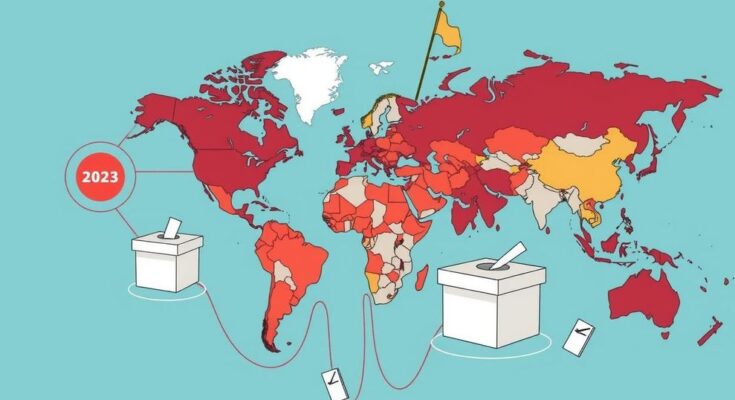The year 2024 saw voters in around 70 countries rejecting incumbent governments due to growing dissatisfaction tied to economic and social disruptions. There was a notable advance in populist and far-right movements, alongside allegations of foreign electoral meddling. These trends led to increased fragmentation and instability within various democracies, emphasizing ongoing challenges faced by established political institutions globally.
In 2024, voters across approximately 70 countries, encompassing half the world’s population, expressed their frustration with incumbents, often delivering a resounding message of dismissal. Incumbents faced backlash as economic turmoil and political instability marred many democracies, leading to unexpected election outcomes. Global political landscapes exhibited fragmentation and volatility, with populist movements gaining momentum while established parties lost traction. This trend was evident from India to the United States, reflecting widespread discontent directed at those in power.
The effects of what political scientist Rob Ford termed “electoral long COVID” played a significant role in shaping voter sentiment. This phrase describes a lingering dissatisfaction rooted in the negative aftermath of the pandemic that exacerbated existing issues like inflation and inequality, especially linked to global conflicts like the war in Ukraine. The resulting public unrest led to significant electoral shifts in countries like South Africa and India, where traditional ruling parties lost long-held dominance.
The rise of extreme political factions, particularly the far right, marked a notable trend. In Europe, significant electoral success for conservative populists suggested that a shift in political power dynamics was underway. Additionally, reports of interference in elections across various nations, particularly from Russia, raised concerns about the integrity of democratic processes. Countries such as Romania and Moldova highlighted the complex intersection between domestic political challenges and foreign influence.
As 2024 drew to a close, uncertainty loomed over global democracies, with Donald Trump’s election victory in the United States underscoring the unpredictability facing global allies and rivals alike. Ongoing political crises in nations like Venezuela and South Korea, coupled with widespread protests in places like Mozambique, illustrated the persistent challenges confronting governments worldwide. As such, the trajectory of democracy appears tumultuous, with upcoming elections in nations like Germany and Canada poised to potentially amplify these trends further.
The backdrop of the tumultuous electoral landscape in 2024 can be traced back to a combination of global phenomena, including economic instability, the lingering effects of the COVID-19 pandemic, and geopolitical tensions such as the war in Ukraine. This environment fostered widespread discontent among voters, leading them to express dissatisfaction with incumbent governments in numerous countries. The rise of disruptive new political movements, particularly on the far right, points to a significant realignment in public sentiment toward established political norms and parties. As nations grapple with domestic unrest and foreign meddling, the stability of democratic institutions worldwide faces critical challenges.
In summary, the electoral landscape of 2024 showcased a pronounced rejection of incumbent governments within numerous countries, driven by pervasive public discontent and significant socioeconomic woes. The election outcomes introduced greater fragmentation within political systems and highlighted a rising inclination towards populism and extremism. Moreover, allegations of electoral interference add to the complexities surrounding global democracies, indicating that the road ahead may remain fraught with challenges and uncertainties regarding governance and public trust.
Original Source: dailyjournal.net




